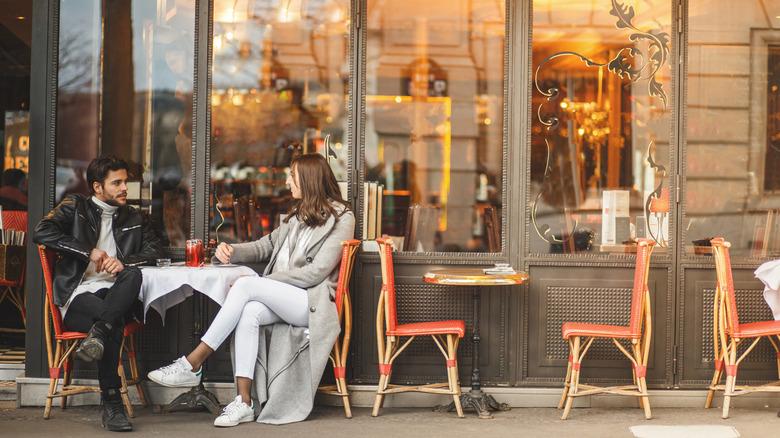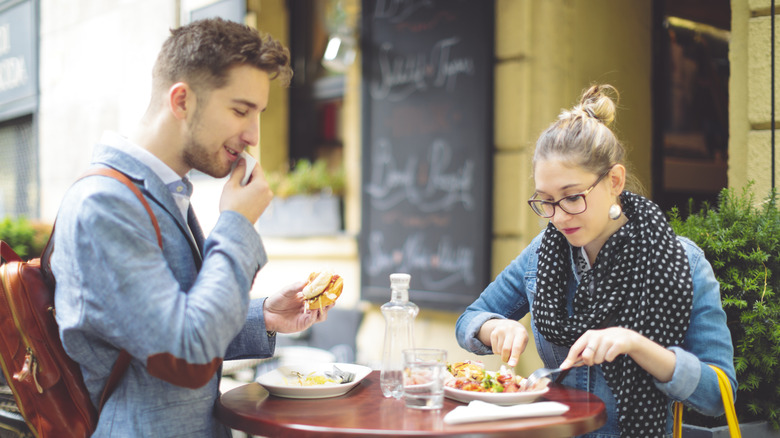Travel Guides International Travel Etiquette
Jenna Busch
Paris, France is the city of lights, the capital of romance, and one of the top culinary destinations in the world. Imagine yourself sipping champagne at a café on the Champs Elysées or gorging on a gorgeous cheese plate after a long, leisurely meal in a top restaurant. It’s the dream of many a food aficionado. That said, there are certain things to keep in mind, as restaurant dining isn’t quite the same in France as it is in America.
Parisian meal etiquette differs in a few key areas, and an important one to keep in mind is how you deal with asking for things from your server (referred to as “Monsieur” or “Mademoiselle” and never “garçon,” which means “boy”). That goes for how you order water, as well as asking for the check to be brought to your table. Here’s all the info you need as well as a few bonus tips to help you navigate your Parisian culinary adventures.
Water and the bill (L’eau et l’addition)

Fotostorm/Getty Images
Parisians usually prefer to savor their meals for much longer than we do in the U.S. This means that your server isn’t going to be clearing things the second you’re done with them to have a faster table turnover. It takes a bit of getting used to, but you can relax and have a conversation, eat slowly, and enjoy the time off your feet as a result.
The slower pace means that the server isn’t going to bring your check the second your plates have been taken away either because the assumption is that you’re going to want to stay for a bit. If you’re, say, heading out to a performance that begins at a certain time, you’ll have to ask for the check by saying, “L’addition s’il vous plaît,” which means “The check, please” and is pronounced, “Lah-dish-ee-on see-voo-play.”
If you want your plate cleared away, make sure to lay your fork and knife across it to indicate that you’re finished. There are a few other phrases to know, like greeting staff at the door of the restaurant with “Bonjour,” for “good day,” and “bonsoir” (“bohn-swah”) for “good evening,” and asking for tap water with “une carafe d’eau, s’il vous plaît” (“eun car-aff doh see-voo-play”), which is a carafe of tap water.
Other tips for dining out in Paris

Song_about_summer/Shutterstock
As for other tips to help you get around in Paris, first, Google Translate is your friend. The app allows you to instantly translate English to French and vice versa. You can also hold your phone’s camera (in the app) over written text and watch it being translated for you instantly, which is really useful for menus. Speaking of which, ordering the prix fixe menu is always a good idea. It’s the selections for each course from the chef and often makes use of the freshest ingredients.
You should also keep in mind that Parisians tend to eat later on average than Americans, and restaurants often close for a few hours after lunch. When looking for a seat, keep in mind that many French restaurants have a smoking section. If that bothers you, it’s worth asking to be seated elsewhere — “La section non-fumeur s’il vous plaît” (Lah sek-shee-on noh-foo-mur see-voo-play) means “The non-smoking section, please.”
Finally, tipping. You don’t have to do it at all, since most restaurants will have a service charge already tacked onto the bill. That said, you are very welcome to leave more if you like the service and want to show it — the typical rate is 5 to 10% of the total bill amount. Bon appétit à Paris!

